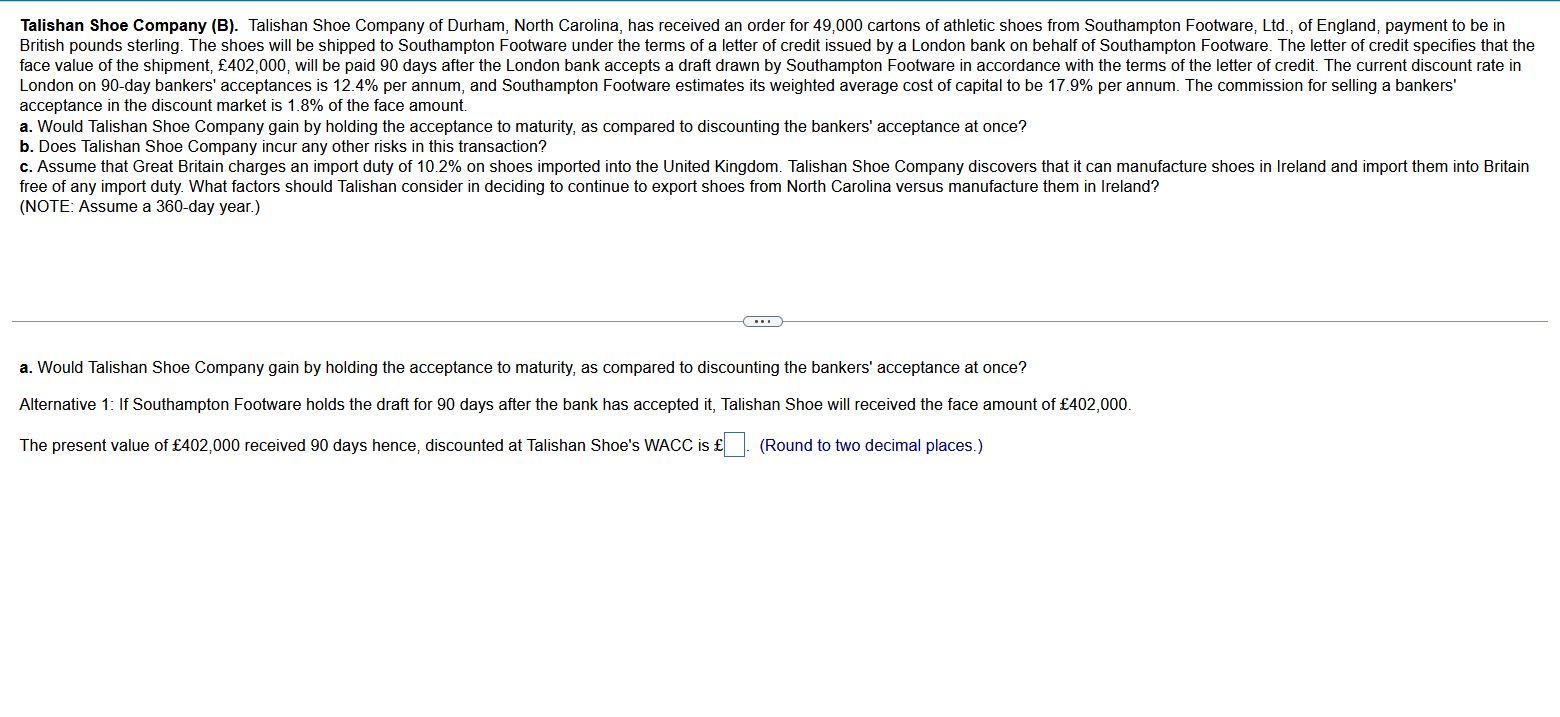Question
T alishan Shoe Company (B).Talishan Shoe Company of Durham, North Carolina, has received an order for 49 comma 000 cartons of athletic shoes from Southampton
T alishan Shoe Company (B).Talishan Shoe Company of Durham, North Carolina, has received an order for 49 comma 000 cartons of athletic shoes from Southampton Footware, Ltd., of England, payment to be in British pounds sterling. The shoes will be shipped to Southampton Footware under the terms of a letter of credit issued by a London bank on behalf of Southampton Footware. The letter of credit specifies that the face value of the shipment, 402 comma 000 , will be paid 90 days after the London bank accepts a draft drawn by Southampton Footware in accordance with the terms of the letter of credit. The current discount rate in London on 90 -day bankers' acceptances is 12.4 % per annum, and Southampton Footware estimates its weighted average cost of capital to be 17.9 % per annum. The commission for selling a bankers' acceptance in the discount market is 1.8 % of the face amount. a. Would Talishan Shoe Company gain by holding the acceptance to maturity, as compared to discounting the bankers' acceptance at once? b. Does Talishan Shoe Company incur any other risks in this transaction? c. Assume that Great Britain charges an import duty of 10.2 % on shoes imported into the United Kingdom. Talishan Shoe Company discovers that it can manufacture shoes in Ireland and import them into Britain free of any import duty. What factors should Talishan consider in deciding to continue to export shoes from North Carolina versus manufacture them in Ireland? (NOTE: Assume a 360-day year.)
alishan Shoe Company (B).Talishan Shoe Company of Durham, North Carolina, has received an order for 49 comma 000 cartons of athletic shoes from Southampton Footware, Ltd., of England, payment to be in British pounds sterling. The shoes will be shipped to Southampton Footware under the terms of a letter of credit issued by a London bank on behalf of Southampton Footware. The letter of credit specifies that the face value of the shipment, 402 comma 000 , will be paid 90 days after the London bank accepts a draft drawn by Southampton Footware in accordance with the terms of the letter of credit. The current discount rate in London on 90 -day bankers' acceptances is 12.4 % per annum, and Southampton Footware estimates its weighted average cost of capital to be 17.9 % per annum. The commission for selling a bankers' acceptance in the discount market is 1.8 % of the face amount. a. Would Talishan Shoe Company gain by holding the acceptance to maturity, as compared to discounting the bankers' acceptance at once? b. Does Talishan Shoe Company incur any other risks in this transaction? c. Assume that Great Britain charges an import duty of 10.2 % on shoes imported into the United Kingdom. Talishan Shoe Company discovers that it can manufacture shoes in Ireland and import them into Britain free of any import duty. What factors should Talishan consider in deciding to continue to export shoes from North Carolina versus manufacture them in Ireland? (NOTE: Assume a 360-day year.)
Step by Step Solution
There are 3 Steps involved in it
Step: 1

Get Instant Access to Expert-Tailored Solutions
See step-by-step solutions with expert insights and AI powered tools for academic success
Step: 2

Step: 3

Ace Your Homework with AI
Get the answers you need in no time with our AI-driven, step-by-step assistance
Get Started


